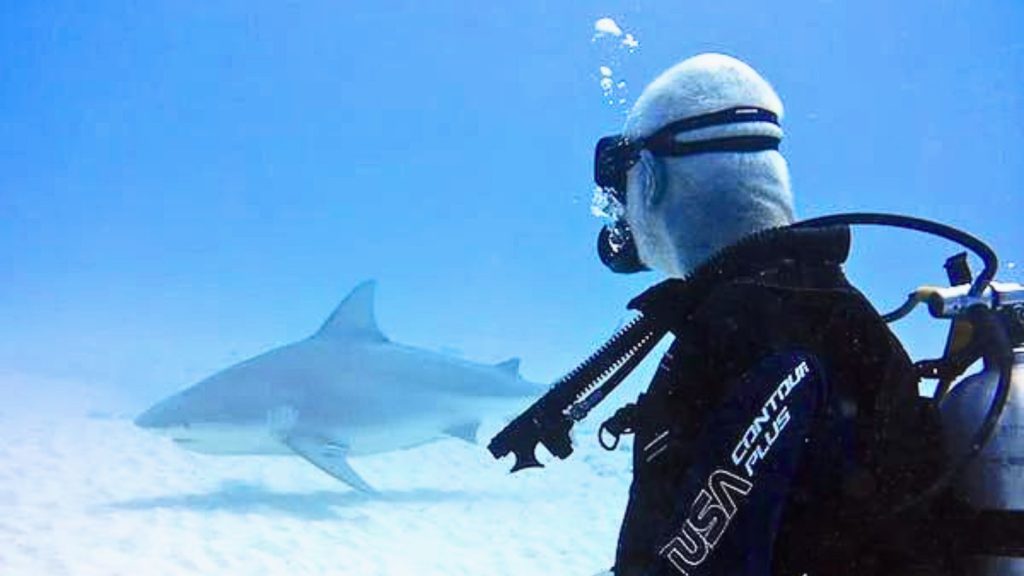Sharks do not enjoy human blood. They are not particularly attracted to human blood, and there is no evidence to suggest that they do. Sharks use their excellent sense of smell to find food in the water, but human blood alone does not make people an appealing quarry for sharks. So, to address the question ‘Do sharks like human blood?’ is; sharks dislike human blood.
Do sharks like human blood?
Would like to highlight below information about the query; “Do sharks like human blood”:
- Sharks and Human Blood: Sharks do not tend to human blood. They are not attracted to it or seek it out as a major food source.
- Sense of Smell: Sharks have an incredible sense of smell, allowing them to identify even tiny amounts of blood in the water. This strong sensibility is necessary to recognize possible food.
- Natural Prey: They are carnivorous animals that hunt aquatic creatures such as fish, seals, and smaller sharks. Their normal diet consists of these species.
- Blood as a Signal: Sharks can detect blood, so they can study possible meals. It is not a sign that they like or prefer human blood in particular.
- Lack of Preference: Sharks don’t consider people their main food source. Human blood alone does not make people an ideal prey item for sharks.
- Shark Attacks on People: the attacks on people are quite infrequent. When they do occur, it typically happens because of a case of incorrect identification or curiosity, rather than an intention of eating human blood.
- Curiosity and investigation: Sharks may approach humans to explore how they are in the sea. Interest can occasionally lead to experiences.
- People as Non-Typical food: Because our size and movements differ from their normal food, sharks usually do not consider people to be part of their natural diet.
- Hunting Behavior: Their natural hunting behavior includes the capacity to sense blood in the water, which helps them locate injured or weaker food.

What attracts sharks to humans?
Sharks may be drawn to people in certain conditions owing to a variety of causes, but it is important to emphasize that such encounters are uncommon.
- Movement and Splashing: Quick movements and spraying in the water could mimic the behavior of anxious victims, possibly attracting the attention of interested sharks.

- Sound: Loud noises or vibrations in the water could grab a shark’s interest or cause them to search for the source of the problems.
- Difference in Water: When looked at from below, sharks might confuse high-contrast items like waves or waterproof clothing for the outline of a possible target item.
- Reflected Light: Sunlight reflected off things on or near the water’s surface can attract a shark’s interest because it is like the shining plates of fish.
- Blood or Bodily Fluids: While sharks are not drawn to human blood as their favorite food source, the possibility of organs or blood in the water could awaken their hunting instinct by warning the possibility of injured or weaker food.
- Attraction or Friend: If the aroma of feed or fish blood is thrown into the water, activities such as fishing or diving with prey might attract sharks. Sharks are attracted to the source of this aroma.
- Migration Routes: Some types of sharks have created movement paths that may connect with popular tourism or fishing locations, increasing the likelihood of meetings.

- Environmental Changes: Changes in water temperature or seasonality, for example, might alter the existence and behavior of sharks in certain places.
- Nesting Collections: Some shark species form collections in particular areas during periods of breeding, which could increase the chance of human-shark interactions.
Related article, check out: Do Shark Eat Dolphin? Unveiling the Truth about this Myth
What type of sharks are attracted to blood?
Most sharks have a strong sense of smell and can detect the smell of blood in the water. However, it is vital to note that sharks are not always attracted to blood to feast on it. Instead, they utilize their sense of smell to find possible food objects in their native marine habitat that are damaged or bleeding.
- Great White Shark: Great white sharks have an extraordinary sense of smell and can detect small amounts of blood in the water from a long distance.
- Tiger Shark: Tiger sharks have an excellent sense of smell and are sometimes called “garbage cans of the sea” because of their varied diet, which includes hunting.

- Bull Shark: Bull sharks are very flexible, living in both saltwater and freshwater settings. They have a keen sense of smell as well.
- Hammerhead Shark: Hammerhead sharks have an outstanding sense of smell, and their unusual head shape helps them to detect a wider range of prey.
- Nurse Shark: Nurse Sharks are noted for their great smell abilities and are frequently located near the ocean floor.
It’s important to note that the discovery of blood is not a sign that these sharks are intentionally looking for human blood. The majority of shark contact with people does not end in attacks, and sharks do not intentionally follow humans as victims. Sharks are often interesting organisms, and a lot of them are non-aggressive.

Will period blood attract sharks?
There is no scientific evidence to suggest that menstruation blood attracts sharks in especially. Sharks have a good sense of smell and can detect blood in the water. The aroma of blood from marine creatures. Which is their natural food, is what attracts them.
Menstrual blood, like all blood, includes iron and may create a fragrance when exposed to water. The amount of blood usually removed during menstruation, on the other hand, is quite tiny and quickly dispersed in the spread of the ocean. Also, the aroma of menstrual blood is unlikely to be more appealing to sharks than other odors in the aquatic environment.
Shark attacks on people are uncommon, and they are hardly related to menstrual blood. If you are concerned about sharks when swimming or taking part in aquatic exercises during your period, you should take the same defines as you would in any shark-prone area, such as following local safety rules and remaining aware of your environment.

How far can a shark smell blood?
Sharks have a wonderful feeling of smell, helping them to detect even the smallest amounts of blood in the wide ocean. Because of their extremely delicate smell organs, these extreme hunters can detect blood up to 5 miles (8 km) away. Their keen sense of smell aids them in hunting down wounded or irritated prey, making them deadly predators in the deep blue. Dive into the world of shark senses and learn how their extraordinary capacity to smell blood identifies them in the aquatic universe.
Shark attack on a human
Every year, around 80 unprovoked assaults are recorded throughout the world. According to Wikipedia, Despite being extremely rare, many people are afraid of shark attacks because of rare serial harm, such as the 1916 Jersey Shore shark attacks, and horror fiction and films such as the Jaws series. Only three shark species, out of over 500, have been blamed for a double-digit number of deadly, unprovoked attacks on humans: the great white, tiger, and bull. Many more castaways are likely to have been killed by the oceanic white tip, but their deaths are not recorded in statistics.
Does urine attract sharks?
- Chemical Composition: Urine’s chemical composition is mostly made up of water and waste materials, mainly acid. These chemical compounds are not commonly connected with the smells of damaged or stressed marine life, which attract sharks.
- Dilution in Water: Urine immediately mixes with the nearby saltwater and becomes extremely weak. As a result, any sign of pee released into the water spreads quickly, making it difficult for sharks to detect it from afar.
- Shark Behavior: Sharks use their sharp sense of smell to identify likely victims. They are more sensitive to the chemical signals released by the blood, body fluids, and natural stinks of the sea organisms they look for.
- Shark Attacks: Shark attacks on people are uncommon and are unrelated to the spilling of pee into the ocean. Other than urine, most shark-human contacts occur because of interest, local behavior, or mistaken identity.
- Safety Precautions: While there is no proof that urine attracts sharks, it is nevertheless important to take security measures when swimming or participating in aquatic sports in shark-prone locations.
The myth that urine attracts sharks is incorrect. Sharks are more interested in the odors of their natural prey, and urine has little impact on their behavior or relationships with humans in the ocean.
Conclusion
Sharks have no connection to human blood as a food source, yet are they naturally drawn to it. The topic “Do sharks like human blood”, it’s important should be noted while sharks have an excellent sense of smell and can detect the smell of blood in the water, their main goal is to seek their natural victims, which includes fish and marine creatures. It is widely believed that sharks love to feed on human blood. Shark attacks on people are uncommon and are usually the result of situations like curiosity, mistaken identity, or other environmental clues. As a result, it is critical to realize that sharks have no taste for human blood because their interactions with humans in the water are more complex and nuanced than a simple attraction to blood.
Most Related Article to Read
- How Fast Can Sharks Swim: Top 6 Fastest Sharks Speed Secrets
- Shark Reproduction: How does sharks reproduce? Matting Status
- Do Sharks Like Human Blood? The Science Behind Their Behavior
- Do Shark Eat Dolphin? Unveiling the Truth about this Myth
- Where Do Salmon Live and Thrive? Their Lifecycle & Habitats
- What Does a Salmon Eat? Facts, Nutrition, Diet & Culinary Choices
- The Best Salmon to Eat: Flavor | Health Benefits| Alaskan | Atlantic
- Jellyfish sting feels, types, symptoms, treatment & sensation
- Does Jellyfish Have Brain, Heart, Bones & Eyes? Learning process
- Does Jellyfish have eyes? 24 eyes of box jellyfish &10 Facts
- Skate vs Stingray: 6 Key Difference Explained
- How Big Can Manta Rays Get? Description, Size & Facts of Giant
- Sea Paradise sailing & snorkeling tours: Kona, Big Island of Hawaii
- Difference Between Manta Rays and Stingrays: Details Comparison
- Best Hawaii Tours: Night Snorkeling with Manta Rays Big Island
- Manta Rays are Endangered: Status, Reason, Threats & Protection
- Best manta ray night snorkel Kona: Place, safety & endanger status
- The 5 Best Nighttime Manta Ray Snorkeling Kona: Tour Guide
- How Big Are Manta Rays? Dive into Their Massive Dimensions
- Do Manta Rays sting? Unmasking the truth of these Ocean Giants

Sumaya, a seasoned writer of five years, is passionate about the ocean, jewelry, and travel. Her articles delve into marine life and the significance of gemstones, particularly diamonds, in bringing prosperity and happiness when worn according to birth-based rules. With a keen interest in sea creatures and a love for coastal destinations, she shares diverse facts and insights with her audience, enriching their understanding of these subjects.





















